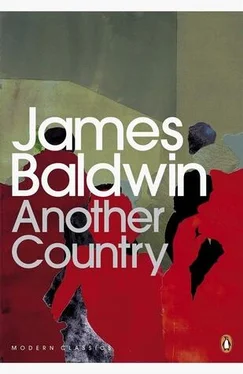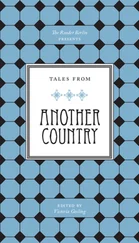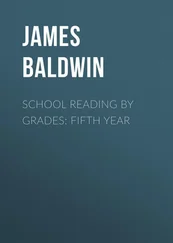“It’s mighty funny,” he said, “that you should envy me.” He rose from the sofa, and walked to the window. Behind him, beneath the mighty lament of the music, a heavy silence gathered: Cass, also, had something to talk about, but he did not want to know what it was. You can’t trust nobody, you might as well be alone . Staring out over the water, he asked, “What was Rufus like — near the end?”
After a moment, he turned and looked at her. “I hadn’t meant to ask you that — but I guess I really want to know.”
Her face, despite the softening bangs, grew spare and contemplative. Her lips twisted. “I told you a little of it,” she said, “in my letter. But I didn’t know how you felt by that time and I didn’t see any point in burdening you.” She put out her cigarette and lit another one. “He was very unhappy, as — as you know.” She paused. “Actually, we never got very close to him. Vivaldo knew him better than — than we did, anyway.” He felt a curious throb of jealousy: Vivaldo! “We didn’t see much of him. He became very involved with a Southern girl, a girl from Georgia—”
Found my long lost friend, and I might as well stayed at home!
“You didn’t tell me that,” he said.
“No. He wasn’t very nice to her. He beat her up a lot—”
He stared at her, feeling himself grow pale, remembering more than he wanted to remember, feeling his hope and his hope of safety threatened by invincible, unnamed forces within himself. He remembered Rufus’ face, his hands, his body, and his voice, and the constant humiliation. “Beat her up? What for?”
“Well — who knows? Because she was Southern, because she was white. I don’t know. Because he was Rufus. It was very ugly. She was a nice girl, maybe a little pathetic—”
“Did she like to be beaten up? I mean — did something in her like it, did she like to be — debased?”
“No, I don’t think so. I really don’t think so. Well, maybe there’s something in everybody that likes to be debased, but I don’t think life’s that simple. I don’t trust all these formulas.” She paused. “To tell the truth, I think she probably loved Rufus, really loved him, and wanted Rufus to love her.”
“How abnormal,” he said, “can you get!” He finished his drink.
A very faint, wry amusement crossed her face. “Anyway, their affair dragged on from bad to worse and she was finally committed to an institution—”
“You mean, a madhouse?”
“Yes.”
“Where?”
“In the South. Her family came and got her.”
“My God,” he said. “Go on.”
“Well, then, Rufus disappeared — for quite a long time, that’s when I met his sister, she came to see us, looking for him — and came back once, and— died .” Helplessly, she opened one bony hand, then closed it into a fist.
Eric turned back to the window. “A Southern girl,” he said. He felt a very dull, very distant pain. It all seemed very long ago, that gasping and trembling, freezing and burning time. The pain was distant now because it had scarcely been bearable then. It could not really be recollected because it had become a part of him. Yet, the power of this pain, though diminished, was not dead: Rufus’ face again appeared before him, that dark face, with those dark eyes and curving, heavy lips. It was the face of Rufus when he had looked with love on Eric. Then, out of hiding, leapt his other faces, the crafty, cajoling face of desire, the remote face of desire achieved. Then, for a second, he saw Rufus’ face as he stared on death, and saw his body hurtling downward through the air: into that water, the water which stretched before him now. The old pain receded into the home it had made in him. But another pain, homeless as yet, began knocking at his heart — not for the first time: it would force an entry one day, and remain with him forever. Catch them. Don’t let them blues in here. They shakes me in my bed, can’t sit down in my chair .
“Let me fix you a fresh drink,” Cass said.
“Okay.” She took his glass. As she walked to the bar, he said, “You knew about us, I guess? I guess everybody knew — though we thought we were being so smart, and all. And, of course, he always had a lot of girls around.”
“Well, so did you,” she said. “In fact, I vaguely remember that you were thinking of getting married at one point.”
He took his drink from the bar, and paced the room. “Yes. I haven’t thought of her in a long time, either.” He paused and grimaced sourly. “That’s right, I certainly did have a few girls hanging around. I hardly even remember their names.” As he said this, the names of two or three old girl friends flashed into his mind. “I haven’t thought about them for years.” He came back to the sofa, and sat down. Cass watched him from the bar. “I might,” he said, painfully, “have had them around just on account of Rufus — trying to prove something, maybe, to him and to myself.”
The room was growing darker. Bessie sang, The blues has got me on the go. They runs around my house, in and out of my front door . Then the needle scratched aimlessly for a second, and the record player clicked itself off. Eric’s attention had painfully snagged itself on the memory of those unloved, but not wholly undesired, girls. Their texture and their odor floated back to him: and it was abruptly astonishing that he had not thought of that side of himself for so long. It had been because of Yves. This thought filled him with a hideous, unwilling resentment: he remembered Yves’ hostile adventures with the girls of the Latin Quarter and St. Germain-des-Près. These adventures had not touched Eric because they so clearly had not touched Yves. But now, superbly, like a diver coming to the surface, his terror bobbed, naked, to the surface of his mind: he would lose Yves, here. It would happen here. And he, he would have no woman, and he would have no Yves. His flesh began to itch, he felt himself beginning to sweat.
He turned and smiled at Cass, who had moved to the sofa, and sat very still beside him in the gloom. She was not watching him. She sat with her hands folded in her lap, busy with thoughts of her own.
“This is one hell of a party,” he said.
She rose, smiling, and shook herself a little. “It is, isn’t it? I was beginning to wonder where the children are — they should be home by now. And maybe I’d better turn on some lights.” She switched on a lamp near the bar. Now, the water and the lights along the water glowed more softly, suggesting the imminent night. Everything was pearl gray, shot with gold. “I’d better go and rouse Richard.”
“I didn’t know,” he said, “that it would be so easy to feel at home again.”
She looked at him quickly, and grinned. “Is that good?”
“I don’t know yet.” He was about to say something more, something about Yves, but he heard Richard’s study door open and close. He turned to face Richard as he came into the room; he looked very handsome and boyish and big.
“So we finally got you back here! I’m told it took every penny Shubert Alley could scrape together. How are you, you old bastard?”
“I’m fine, Richard, it’s good to see you.” They clung together, briefly, in the oddly truncated, shrinking, American embrace, and stepped back to look at one another. “I hear that you’re selling more books than Frank Yerby.”
“Better,” said Richard, “but not more.” He looked over at Cass. “How are you, chicken? How’s the headache?”
“Eric started telling me about Paris, and I forgot all about it. Why don’t we go to Paris? I think it would do wonders for us.”
“Do wonders for our bank account, too. Don’t you let this lousy ex-expatriate come here and turn your head.” He walked over to the bar and poured himself a drink. “Did you leave many broken hearts over there?”
Читать дальше












